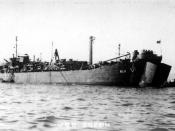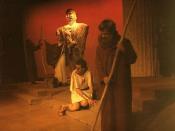Thesis: CreonÃÂs absolute power over the citizens of Thebes, the chorus, and Haimon has made Creon think himself to be superior than others and this provincial view on problems has blinded him against foreseeable future punishments that are potentially hazardous to both the public good and Creon himself.
CreonÃÂs initial view, and modified reverberated views of power throughout the play is to the benefit of the people and society. He upheld the benefits ofo Public good over private gains.
o Threats to state stability should not be supported (anarchists)o Loyalty above all else.
o Greed and corruption are the downfalls of civilizations.
As the play progresses, CreonÃÂs abuse of power and his modification of his initial view on power becomes more and more evident in his vitriolic criticisms of other characters and the impact of his actions of others.
o Teiresias: corruption of prophetso Choragos: corruption of old men.
o Haimon: open threats against father, against son-subservient-to-father rule.
o Sentry: corrupted by bribery, threats of death.
o Chorus and community: too fearful to confront Creon concerning problems.
CreonÃÂs downfall is ultimately a result of his abuse of power and ironic corruption, criticized and reflected in the odes of the chorus and indirectly himself.
o ÃÂThe State is the King!ÃÂ (Creon)o Whoever is chosen to govern should be obeyed ÃÂ must be obeyed, in all things, great and small, just and unjust!ÃÂ (Creon)o Conflicts with Teiresias, Haimon, Choragos, and Antigone, in which Creon is the acting force.
o Chorus members disassociate themselves from the acts of Creon, fearing his abuse of power over the gods will cause anger from the gods


